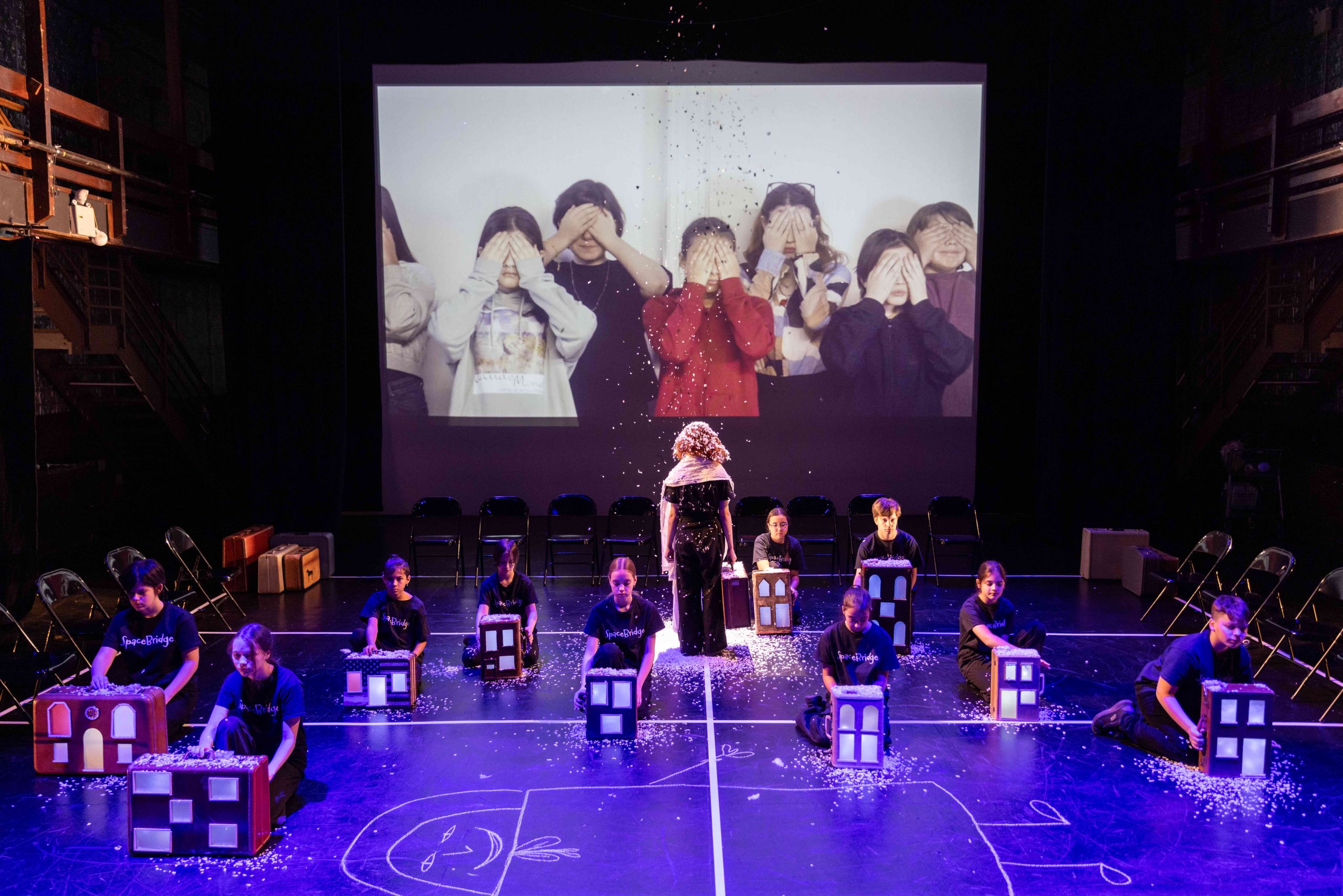
Irina Kruzhilina, School of Drama Faculty Member, Debuts Play about Russian Refugee Children and the War in Ukraine
Irina Kruzhilina, a faculty member in the School of Drama, moved to the United States from the former Soviet Union the year that Vladimir Putin became president. Watching the full-scale invasion of Ukraine by Russian forces has been extremely difficult for her, not only because of where she was born, but because her mother was born in Ukraine, and her father is a Georgian Jew.
Since the beginning of the war, she has redirected her artistic efforts towards supporting Ukrainian artists, with the hope of raising awareness about the crimes being perpetuated against their homeland. Her most recent project is “SpaceBridge,” a co-production between En Garde Arts, La MaMa ETC and Visual Echo, which premiered at La MaMa’s Ellen Stewart Theatre in January as part of the prestigious Under the Radar Festival.
Kruzhilina was inspired to create her project after hearing stories of Russian refugees who had fled their country due to their anti-war and pro-democracy stances. Many of them came with children, and are living in New York City shelters as they await court hearings to determine if they can stay in the United States.
“We are painfully familiar with the suffering and displacement of Ukrainian families,” explains Kruzhilina. “The plight of Russian children, whose families have also been forced to leave their homes to seek refuge from persecution, is seldom discussed. And in fact, it is my observation that at the moment Russians in America, children or adults, refugees or otherwise, are often regarded with suspicion. As a theater maker and educator, I wondered if I could use some of the theater making tools to disrupt social bias, hate, and violence.”
The project began with a series of workshops, where a group of Russian refugee kids and teens, forced to leave their homes because of their families’ opposition to the war and Putin,collaborated with their American peers to explore various themes through conversation, collage-making, drawings, letters, and more. From there, a script was developed, and rehearsal footage and interviews were added in.
For the performance, the children are joined on stage by a single adult actor, Ellen Lauren, whose character is based on the life of Samantha Smith, a 10-year old girl from Maine who managed to bridge children between two cultures at the peak of the Cold War. In 1983 she wrote a letter to the Soviet Union President Yuri Andropov asking him if he really wanted to start a nuclear war with the U.S. and as a result of this letter was invited to visit the Soviet Union. Although Smith passed away in a plane accident, her character is alive in the show, and she helps facilitate the dialogue between the Russian and American groups.
“The message or thought we hope audiences will walk away with from this show is the recognition of the profound resilience, creativity, and hope embodied by young voices, especially those of refugee children,” shares Kruzhilina. “These children, shaped by trauma and displacement, possess a rare honesty and imaginative perspective that challenge adult assumptions and inspire innovative solutions to global issues.”
Throughout the workshop process, Kruzhilina worked closely with students from the School of Drama, as well as Alba Quezada, a fellow faculty member who joined the production as a voice coach. The students performed a variety of duties, and assisted in devising a few scenes.
“It’s much easier for me to develop material with a few students rather than with 19 kids in the room!” says Kruzhilina. “Additionally, Quezada worked closely with the performers, especially the Russian-speaking actors, helping them improve their speech (several have very limited English) and project their voices. Her guidance was invaluable—not only did they shine on stage, but they also gained much more confidence in the way they speak and present themselves.”
The project has garnered praise from the media, where it’s been covered by The New York Times, American Theatre, Theater Mania, and more. Currently, Kruzhilina is at work on a satirical performance, A Notice to Appear, that critiques the arbitrary nature of the United States’ asylum policy, which she learned about as she created SpaceBridge. A Notice to Appear will explore the ways in which refugees must “perform” during their interviews to prove that they are worth staying in the U.S.
For SpaceBridge, Kruzhilina hopes to bring the performance to Washington, D.C. as she feels the piece is more urgent than ever.
“In addition, my goal is to build new spacebridges with local and refugee youth in various communities around the world, to spark a youth-led conversation around identity and belonging. I believe that this conversation is more critical than ever in the context of the global refugee crisis.”